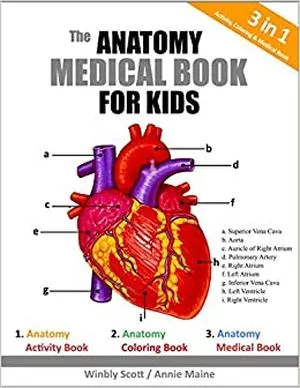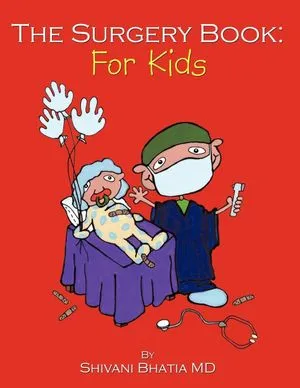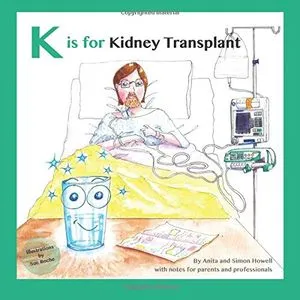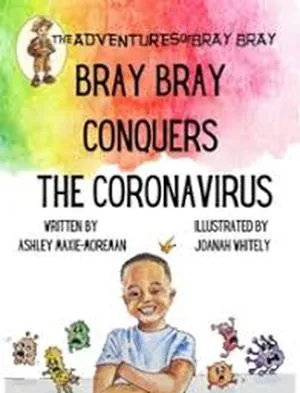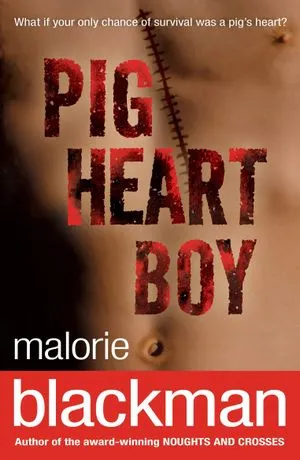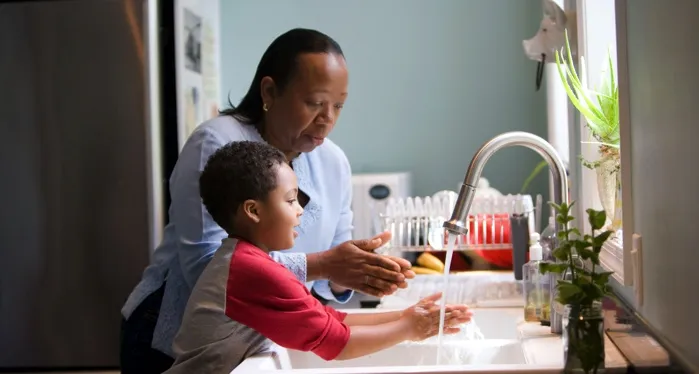
Health and Happiness: Medical Books For Kids
Health—and ill health—can be a source of anxiety for children even at the best of times, whether they’re dealing with illness themselves, have friends or family members who are ill, or are just beginning to learn that while their bodies are amazing tools, they sometimes need a bit of care. Here are some recommendations for medical books for kids to help demystify illness, healthcare, and the human body, whatever your child’s age or reading level.
The Anatomy Medical Book for Kids by Annie Maine and Winbly Scott
The Anatomy Medical Book for Kids is a fantastic resource for children to learn about all the different parts of the human body. An anatomy book and a colouring book all in one, this book will show your child how their body works and encourage their creativity at the same time.
Usborne First Experiences: Going to the Doctor by Anne Civardi
Visiting the doctor can be an intimidating experience whatever your age, but when you’re very young, it can be genuinely frightening. Civardi’s book shows small children that getting a checkup doesn’t have to be scary and gives them an idea of what to expect during their trip. And as it’s an Usborne book, you can try to spot the yellow duck on every page as you read together.
Usborne Look Inside Your Body by Louie Stowell
This lift-the-flap book is another great resource for teaching your child about anatomy, showing how different bodily processes (breathing, digesting, using your brain) happen in a way simple enough for even very young children to understand. This lighthearted book will help your child learn about themselves without making it too serious—and kids who love toilet humour will be very happy.
The Surgery Book for Kids by Shivani Bhatia
Getting surgery is scary when you’re a child, but this book demystifies the process, showing the reader what will happen every step of the way as the hero, Iggy, goes to hospital to get his tonsils removed.
The Cure for a Crime by Roopa Farooki
While it’s fiction, this kid detective story has a fun and fascinating medical theme. Twins Ali and Tulip know all about medicine, as their mum is a surgeon – but when she starts getting ill, the twins realise they have to find a diagnosis and save their mother before it’s too late.
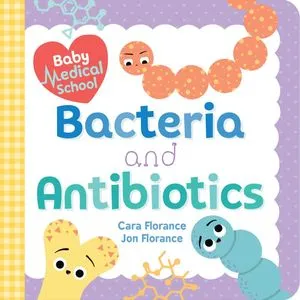
Baby Medical School: Bacteria and Antibiotics by Cara Florance and Jon Florance
As well as having incredibly cute illustrations, this book is a fantastic way to introduce the idea of bacteria to very small children. Bacteria and Antibiotics will teach your little ones why they get sick, how to avoid it, and the difference between good and bad bacteria.
Mummy’s Lump by Gillian Forrest
Mummy’s Lump is a book aimed at children with a parent who has been diagnosed with breast cancer. Based on the author’s own experiences, the book is a helpful way to open the conversation about cancer and ways to explain adult illness to children.
The Invisible String by Patrice Karst
Sadly, mental illness in kids is on the rise, but luckily there are plenty of books to help children understand mental illness in themselves, friends, or family members. The Invisible String focuses on connections, and is a great resource for parents or guardians who want to help their children through anxiety and stressful times.
K is for Kidney Transplant by Anita Howell and Simon Howell
Lucy and Jack’s father needs a kidney transplant, and this book follows the family as they go through this major medical procedure together. Written by two medical professionals who went through this experience and wanted to find a way to explain things to their own young children, K is for Kidney Transplant covers many aspects of renal illness and surgery.
The Year My Mother Was Bald by Ann Speltz
Set up as a journal and scrapbook, this book follows Clare through the year of her mother’s cancer diagnosis and treatment. Giving details of the illness and different kinds of treatment as well as digging into Clare’s fears and feelings, The Year My Mother Was Bald is a frank but illuminating look at what it’s like when a parent has cancer.
Why Am I So Tired? A First Look at Childhood Diabetes by Pat Thomas
Type 1 diabetes is a common childhood illness, but it can still be difficult to understand, especially for young children. Why Am I So Tired? clearly sets out what it’s like to live with diabetes, the medications diabetic children may use, and the ways it can be managed.
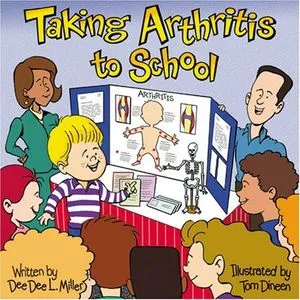
Taking Arthritis to School by DeeDee L. Miller and Tom Dineen
Aimed at very young children, this is a great introduction to paediatric arthritis, giving information that will help kids with the condition, or who have siblings or friends who are dealing with arthritis. With colourful illustrations and clear descriptions, it’s a great resource.
I’m No Different Than You by Jaime Mahaffey and Kristy High
Kayla has sickle cell anaemia, but it’s just one aspect of who she is and she has plenty of other things going on in her life. However, when she starts a new school, Kayla becomes anxious about managing her condition, and how her new friends will react when they learn about her illness. I’m No Different Than You is a great way to learn about sickle cell anaemia, with a loveable and determined heroine.
My Strong Mind by Niels Van Hove
Health issues can often have an impact on mental health, and many children deal with mental illness. My Strong Mind contains kid-friendly tips on developing resilience and dealing with everyday stress or more acute incidents of anxiety. As well as working through techniques like mindfulness and self-acceptance, this book encourages kids and their guardians to talk about mental health.

Chemo to the Rescue by Caitlin Knutsson and Mary Brent
Co-authored by child leukemia survivor Caitlin, this picture book is a reassuring introduction to this common childhood illness, and the ways it’s treated— including chemo. Chemo to the Rescue is another helpful read for children who are facing treatment themselves, or who know someone who is.
Your Fantastic Elastic Brain by JoAnn Deak
The brain is sometimes overlooked in medical books for kids, but Your Fantastic Elastic Brain redresses that balance. The book doesn’t just teach you how your brain works—it also delves into tips and tricks that children can use to take control of their brains.
First Human Body Encyclopedia by Dorling Kindersley
If you’ve got a budding biologist, this comprehensive encyclopaedia by educational titan Dorling Kindersley is the perfect gift. With beautiful, clear illustrations, this book will help your child learn about all the different systems of the human body and how they work together.
Bray Bray Conquers the Coronavirus by Ashley Maxie-Moreman and Joanah Whitely
COVID-19 is a topic that many children (and everyone else) may find confusing and frightening. Luckily, this book gives a clear explanation of what the coronavirus is, the best ways to stay safe from infection, and also helps children deal with their feelings as they process the new normal. (At the time of writing, this book is available free from Emory Global Health Institute).
We’re Going to be OK by Ebony Jade Hilton
Another great COVID resource, this book is aimed at helping children manage their stress about the virus, especially children from vulnerable groups. A medical doctor herself, author Ebony Jade Hilton has created a book that will help children of frontline workers, particularly from Black and POC communities. (At the time this post was published, this book was available for free from Emory Global Health Institute).
Cell Biology for Babies by Haitham Ahmed
Getting right down to the basics of anatomy, this book explains cells in a way that even very small children can understand. With clear illustrations and explanations, this is also a useful primer for any parents who want to brush up on their cell biology!
Pig-Heart Boy by Malorie Blackman
Delving a little into sci-fi (but the kind of sci-fi that’s very close to becoming a reality), this classic book by Malorie Blackman follows the story of Cameron, a boy with a serious heart condition who’s offered a groundbreaking new treatment: a heart transplant from a genetically engineered pig. Looking at medical ethics as well as medical treatment, this is a great medical read for older kids.
How Your Body Works by Judy Hindley
“Recommend” is a strong word for this book, but it deserves a special mention for being educational and yet utterly bizarre. As a child growing up in the late ’80s, this book taught me how bodies fight off pathogens by depicting the human body as a castle guarded by white blood cell knights, a useful metaphor. It taught me the way digestion worked by showing an eating, digesting, and excreting machine. And it had a page about sex ed…featuring large, industrial-equipment-looking robots. That last part didn’t illuminate so much as thoroughly confuse, so while your kid will probably need a few extra explanations after reading this one, it’s good for a giggle.
To help your kids broaden their knowledge even further, check out our list of 25 of the Best Children’s Books About Health and Safety. If building up your children’s booklist has piqued your own interest in medicine, we have plenty of options for adults, too.



